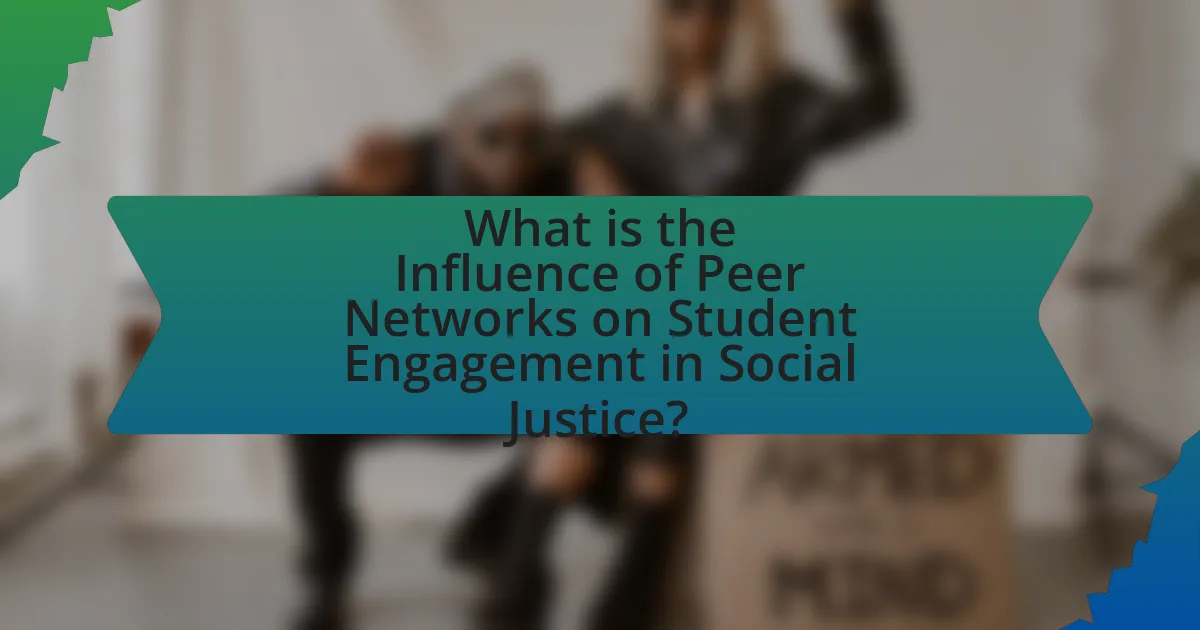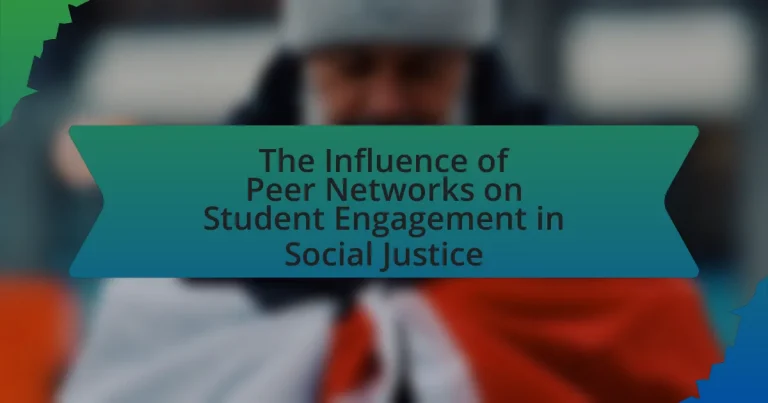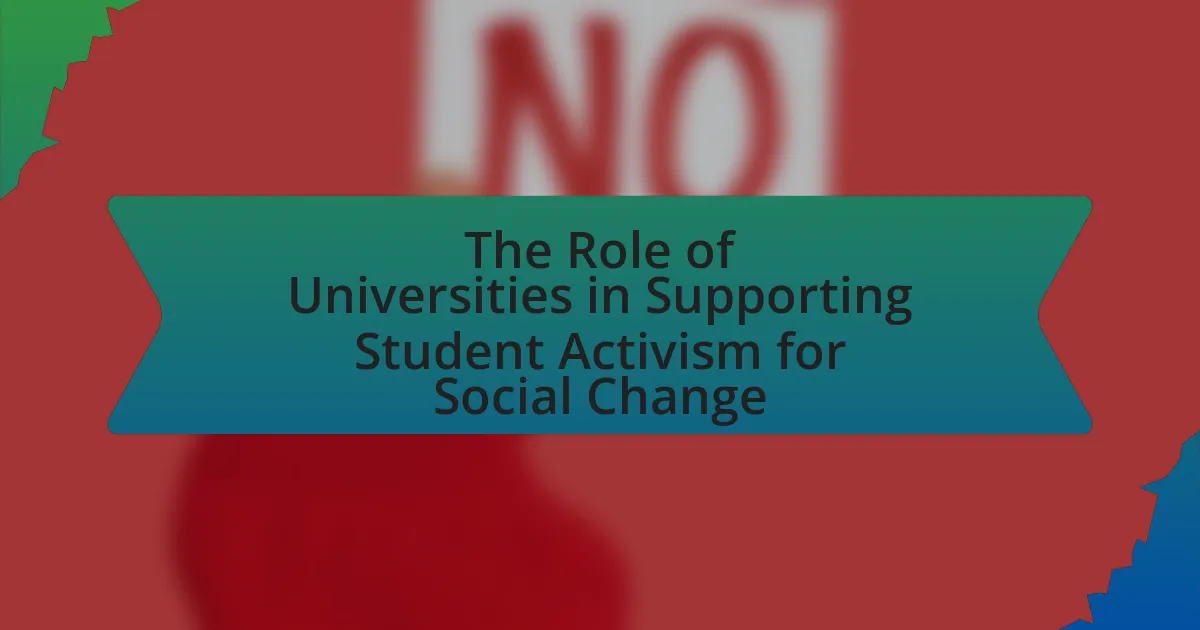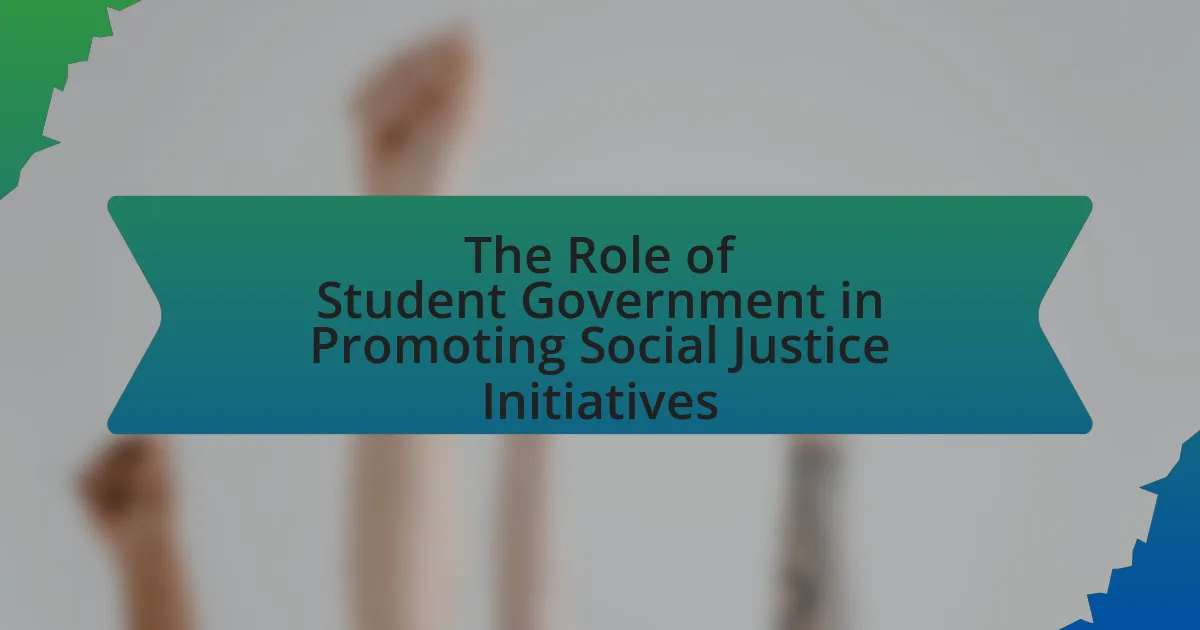The article examines the influence of peer networks on student engagement in social justice, highlighting how these networks foster community, shared purpose, and motivation for participation in social justice initiatives. It discusses the role of peer discussions in shaping perceptions, enhancing understanding, and increasing willingness to engage in social justice activities. Additionally, the article outlines the benefits of student involvement in social justice initiatives, including improved academic performance and personal development, while also addressing challenges faced by peer networks and strategies to overcome them. Best practices for leveraging peer networks to enhance engagement in social justice are also presented, emphasizing the importance of open communication, inclusivity, and collaborative projects.

What is the Influence of Peer Networks on Student Engagement in Social Justice?
Peer networks significantly enhance student engagement in social justice by fostering a sense of community and shared purpose. Research indicates that students are more likely to participate in social justice initiatives when they are surrounded by peers who are also committed to these causes. For instance, a study published in the Journal of Higher Education found that students involved in peer-led organizations reported higher levels of engagement in social justice activities, demonstrating that social connections can motivate individuals to take action. Additionally, peer influence can lead to increased awareness and understanding of social justice issues, as students often share resources and perspectives within their networks, further amplifying their collective impact.
How do peer networks shape student perceptions of social justice?
Peer networks significantly shape student perceptions of social justice by facilitating discussions and shared experiences that influence individual beliefs and attitudes. Research indicates that students often align their views on social justice issues with those of their peers, as social interactions create a collective understanding and reinforce shared values. For instance, a study by McFarland and Thomas (2006) found that students who engage in social justice conversations within their peer groups are more likely to develop a critical awareness of societal inequalities. This dynamic illustrates how peer influence can lead to a heightened sense of social responsibility and activism among students.
What role do peer discussions play in understanding social justice issues?
Peer discussions significantly enhance the understanding of social justice issues by facilitating diverse perspectives and critical thinking. Engaging in dialogue with peers allows individuals to confront their biases, share personal experiences, and collaboratively analyze complex social dynamics. Research indicates that students who participate in peer discussions are more likely to develop empathy and a nuanced understanding of social justice topics, as evidenced by a study published in the Journal of Social Issues, which found that collaborative learning environments promote deeper engagement with social issues. This interaction fosters a sense of community and encourages active participation in social justice initiatives, ultimately leading to more informed and socially conscious individuals.
How does peer influence affect students’ willingness to engage in social justice activities?
Peer influence significantly enhances students’ willingness to engage in social justice activities. When students observe their peers actively participating in social justice initiatives, they are more likely to feel motivated to join these efforts themselves. Research indicates that social norms established within peer groups can create a sense of accountability and belonging, which encourages individual participation. For instance, a study published in the Journal of Youth and Adolescence found that adolescents are more likely to engage in civic activities when they perceive their friends valuing such behaviors, demonstrating the direct correlation between peer attitudes and individual actions in social justice contexts.
Why is student engagement in social justice important?
Student engagement in social justice is important because it fosters critical thinking and empowers students to address societal inequalities. Engaged students are more likely to participate in community initiatives, advocate for change, and develop a sense of responsibility towards social issues. Research indicates that students involved in social justice activities demonstrate higher levels of civic engagement and academic achievement, as seen in studies like “The Role of Civic Engagement in Student Success” by the American Association of Colleges and Universities, which highlights the correlation between civic involvement and improved educational outcomes.
What are the benefits of student involvement in social justice initiatives?
Student involvement in social justice initiatives enhances critical thinking and civic engagement. Engaging in these initiatives allows students to analyze societal issues, develop empathy, and understand diverse perspectives. Research indicates that students who participate in social justice activities are more likely to become active citizens, as evidenced by a study from the Center for Information and Research on Civic Learning and Engagement, which found that youth involved in civic activities are 50% more likely to vote in future elections. Additionally, involvement fosters leadership skills and teamwork, as students collaborate with peers to address community challenges, thereby strengthening their social networks and support systems.
How does engagement in social justice impact students’ academic and personal development?
Engagement in social justice significantly enhances students’ academic and personal development by fostering critical thinking, empathy, and a sense of agency. Students involved in social justice initiatives often demonstrate improved academic performance, as these activities encourage active learning and application of knowledge to real-world issues. Research indicates that participation in social justice projects can lead to higher levels of civic engagement and social responsibility, which are linked to better educational outcomes. For instance, a study by the Center for Information and Research on Civic Learning and Engagement found that students who engage in community service and social justice activities are more likely to achieve higher grades and develop stronger leadership skills. Additionally, personal development is enriched through exposure to diverse perspectives, enhancing interpersonal skills and emotional intelligence, which are crucial for personal growth and future career success.
What factors contribute to the effectiveness of peer networks in promoting social justice engagement?
Peer networks are effective in promoting social justice engagement due to their ability to foster trust, provide emotional support, and facilitate the sharing of resources and information. Trust within peer networks encourages open dialogue and collaboration, which are essential for mobilizing collective action. Emotional support from peers enhances individual motivation and resilience, making participants more likely to engage in social justice initiatives. Additionally, peer networks often serve as platforms for sharing knowledge and strategies, which can amplify the impact of social justice efforts. Research indicates that students involved in peer networks report higher levels of engagement in social justice activities, demonstrating the positive correlation between peer support and activism.
How does the diversity of peer networks influence engagement levels?
The diversity of peer networks significantly enhances engagement levels by providing varied perspectives and experiences that foster deeper discussions and understanding. Research indicates that students in diverse peer groups are more likely to engage in critical thinking and collaborative learning, as they encounter different viewpoints that challenge their own beliefs. For instance, a study published in the Journal of Educational Psychology found that students exposed to diverse peers reported higher levels of engagement and motivation, as they felt more connected to the learning process and were encouraged to participate actively in discussions related to social justice issues. This interaction not only broadens their understanding but also cultivates a sense of belonging and community, which further boosts engagement levels.
What characteristics of peer networks enhance their impact on student engagement?
Peer networks enhance their impact on student engagement through characteristics such as shared goals, mutual support, and diverse perspectives. Shared goals create a sense of purpose among students, motivating them to participate actively in discussions and activities related to social justice. Mutual support fosters an environment where students feel safe to express their thoughts and ideas, leading to increased participation. Diverse perspectives enrich conversations, allowing students to learn from each other and challenge their own viewpoints, which is crucial in social justice contexts. Research indicates that these characteristics lead to higher levels of engagement and commitment among students, as they feel more connected and invested in their learning experiences.
How can educators leverage peer networks to enhance student engagement in social justice?
Educators can leverage peer networks by facilitating collaborative projects that focus on social justice issues, thereby enhancing student engagement. By creating opportunities for students to work together in groups, educators can foster discussions that encourage critical thinking and diverse perspectives on social justice topics. Research indicates that peer collaboration increases motivation and commitment to social causes, as students feel a sense of belonging and shared responsibility. For instance, a study by the National Education Association found that students engaged in peer-led discussions about social justice issues demonstrated higher levels of empathy and civic engagement. This approach not only deepens understanding but also empowers students to take action within their communities.
What strategies can students use to strengthen their peer networks for social justice?
Students can strengthen their peer networks for social justice by actively participating in collaborative projects and initiatives that focus on social issues. Engaging in community service, organizing awareness campaigns, and forming study groups centered around social justice topics fosters connections among peers who share similar values and goals. Research indicates that students involved in such collaborative efforts are more likely to develop a sense of belonging and commitment to social justice causes, enhancing their collective impact. For instance, a study by the American Psychological Association found that students who engage in group activities related to social justice report higher levels of social responsibility and community involvement.
How can students create inclusive environments that foster social justice discussions?
Students can create inclusive environments that foster social justice discussions by actively promoting diverse perspectives and encouraging open dialogue. This can be achieved through organizing workshops and discussion groups that focus on social justice issues, ensuring that all voices are heard and respected. Research indicates that peer networks significantly influence student engagement; for instance, a study by the American Educational Research Association found that inclusive peer interactions enhance students’ willingness to participate in social justice conversations. By establishing ground rules for respectful communication and facilitating activities that highlight various cultural experiences, students can cultivate a space where social justice discussions thrive.
What resources are available to support peer-led social justice initiatives?
Peer-led social justice initiatives can be supported by various resources, including funding opportunities, training programs, and community partnerships. Funding sources such as grants from organizations like the Ford Foundation and the Open Society Foundations provide financial backing for grassroots projects. Training programs offered by institutions like the National Conference for Community and Justice equip peer leaders with skills in advocacy and organizing. Additionally, community partnerships with local nonprofits and educational institutions enhance resource sharing and provide mentorship, fostering a collaborative environment for social justice efforts. These resources collectively empower peer-led initiatives to effectively address social issues and engage participants in meaningful ways.
What are the challenges faced by peer networks in promoting social justice engagement?
Peer networks face several challenges in promoting social justice engagement, including lack of resources, varying levels of commitment among members, and potential conflicts within the group. Limited funding and access to educational materials hinder the ability of these networks to effectively organize events and outreach initiatives. Additionally, differing motivations and engagement levels among peers can lead to inconsistent participation, which undermines collective efforts. Conflicts may arise from differing perspectives on social justice issues, making consensus difficult and potentially fracturing the network. These challenges can impede the overall effectiveness of peer networks in fostering meaningful social justice engagement.
How can peer networks overcome resistance to social justice topics among students?
Peer networks can overcome resistance to social justice topics among students by fostering open dialogue and creating safe spaces for discussion. These networks encourage students to share personal experiences and perspectives, which can humanize social justice issues and reduce defensiveness. Research indicates that peer-led initiatives, such as discussion groups or workshops, significantly enhance empathy and understanding among participants. For instance, a study published in the Journal of Social Issues found that students who engaged in peer-led discussions about social justice topics reported increased awareness and willingness to engage with these issues. By leveraging the influence of peers, networks can effectively challenge misconceptions and promote a culture of inclusivity and awareness.
What strategies can be implemented to address conflicts within peer networks regarding social justice issues?
To address conflicts within peer networks regarding social justice issues, implementing open dialogue and facilitated discussions is essential. These strategies encourage participants to express their perspectives and grievances in a structured environment, promoting understanding and empathy. Research indicates that structured dialogue can reduce tensions and foster collaborative problem-solving, as seen in initiatives like the National Issues Forums, which successfully engage diverse groups in constructive conversations about contentious topics. Additionally, training peer leaders in conflict resolution techniques can empower them to mediate disputes effectively, ensuring that all voices are heard and respected. This approach not only resolves immediate conflicts but also builds a culture of respect and inclusivity within peer networks.
What best practices can enhance the influence of peer networks on student engagement in social justice?
Best practices that can enhance the influence of peer networks on student engagement in social justice include fostering open communication, creating inclusive environments, and facilitating collaborative projects. Open communication allows students to share experiences and perspectives, which can deepen understanding and commitment to social justice issues. Inclusive environments ensure that all voices are heard, promoting diverse viewpoints that enrich discussions and actions. Collaborative projects, such as community service or advocacy campaigns, provide practical experiences that reinforce the importance of social justice, encouraging students to take active roles in their communities. Research indicates that peer-led initiatives significantly increase student participation and investment in social justice efforts, demonstrating the effectiveness of these practices.




